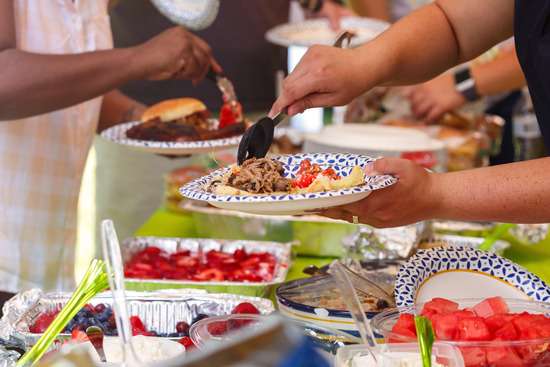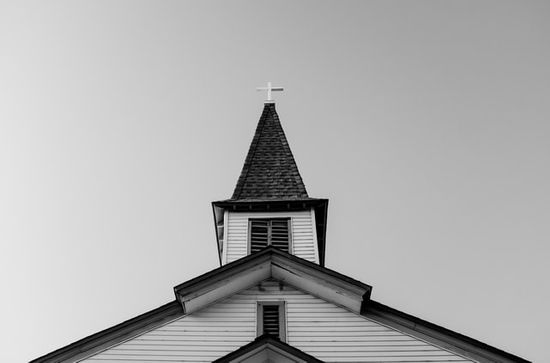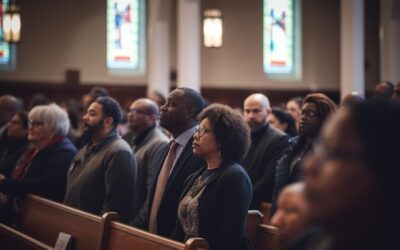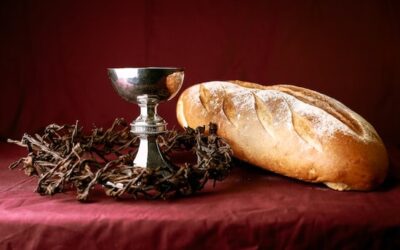Every so often, usually on a schedule ranging from once a week to once a month to once a quarter, an Adventist church will have “fellowship dinners,” often casually referred to as potlucks.
One of the best parts about getting together with a church family on Sabbath is the fellowship we can experience.
The word “fellowship” may not be used very often in everyday conversation, but it has special meaning in a church setting. It’s about spending quality time together with the intention of building and deepening friendships.
Adventists value fellowship as an integral part of their faith community. And what better way to help make that happen than bonding over food. Adventists often “break bread together” with a fellowship lunch!
During these potluck Sabbaths, families bring all kinds of different dishes, and we will all share a big meal together.
But let’s go through the details together:
- What exactly is church potluck?
- Who goes to a potluck dinner?
- Why do Adventist churches have it?
- How can I participate in a church potluck?
So if you’ve been invited to a potluck, want to go to a potluck, or just want to know what it’s all about, here’s what you’ll want to know.
What is church potluck?

Photo by Victoria Shes on Unsplash
Put simply, a church potluck is a meal gathering when individuals and families each bring a delicious dish for everyone to share.
You might see this potluck meal called “fellowship dinner” or “fellowship meal” on church signs or bulletins, or on their social media or website announcements.
Often, people bring their dishes in the morning before the church service, placing them in the kitchen or meal area. Then, after service is over, volunteers will set out the dishes on large serving tables, along with plates and utensils.
And because our congregations are often diverse and full of people from different cultures and ethnicities, the recipes and dishes often reflect that. It can be a real treat!
What else should you expect from an Adventist church potluck in terms of food?
Dishes are often vegetarian, to make them as inclusive as possible. Some might also bring vegan dishes to the shared meal.
It’s also normal to have many different types of dishes. Some people will bring a home-cooked meal or a family recipe, some will bring dinner rolls, some will bring frozen lasagna to heat up in the church kitchen, some will bring salad or soup, and some will bring dessert (Yum!).
All of these are welcome and necessary! Variety and community are crucial parts of church potluck.
But food isn’t the only thing that makes church potluck special.
There are a lot of reasons churches host fellowship dinners, so let’s explore some of those reasons.
Why do churches have potluck?
Every church potluck is going to look different. Some congregations are small and might share potluck every week because they are so close-knit. Other congregations are larger and might only have potluck-style gatherings a few times a year. But whatever the size of the church, most Adventist churches have potluck for similar reasons:
Let’s talk about each of these.
To cultivate relationships
 Have you ever been in a situation where you see people repeatedly—like at a job or in a class—but you never really truly get to know them?
Have you ever been in a situation where you see people repeatedly—like at a job or in a class—but you never really truly get to know them?
In fact, you might recognize their faces but not even know their names
Trust us, you’re not alone.
It’s easy to show up to a gathering, spectate, and then leave. Church can be the same way. Especially if we’re feeling more reflective than social.
Potluck is a means to remedy that!
Sharing food with one another ensures that we can slow down, sit down, and talk. Or even just be together, regardless of the depth of conversation.
Not only are we able to reconnect with people we haven’t spoken to in a while, but we are also able to connect with people we don’t know well or don’t know at all.
People might come to potluck physically hungry, but by the time they’re done eating and it’s time to go home, they’ll have been physically, emotionally, and spiritually fed.
Coming to potluck is an opportunity to feel that kind of fellowship and connection.
To follow Jesus’ example
The importance of gathering for a good meal comes from the example of Jesus and the early followers of Christianity.
Much of the gospels is filled with stories of Jesus sharing meals with people. All kinds of people: Pharisees, tax collectors, adulterers and adulteresses, even the disciple that would betray Him to the religious leaders, leading to Jesus’ crucifixion (Luke 7, 19, 22).
When we gather together for a meal, we have the opportunity to forget any differences and simply share food with each other.
After Jesus’ death, resurrection, and return to heaven, the early Christian church kept the tradition of sharing meals with each other. The book of Acts tells us that as the Church was growing, they continued “steadfastly in the apostle’s doctrine and fellowship, in the breaking of bread, and in prayers” (Acts 2:42, NKJV).
A growing church needs to grow in community! “Breaking bread” is one of the ways the early Christian church developed that kind of community.
When God’s people practice fellowship meals, we follow the example of Jesus and of the apostles of the early church.
To exhibit hospitality
 Potluck is a chance for an Adventist church to not only welcome people to a place of worship, but also to make people feel truly at home.
Potluck is a chance for an Adventist church to not only welcome people to a place of worship, but also to make people feel truly at home.
Spirituality and church can be sensitive topics. And for many, church could even be an uncomfortable place based on their past experiences.
By opening up church doors to share a meal with whoever would like to join, Adventists want to make church welcoming and comforting. No intimidation or gate-keeping.
And of course, there is nothing like a huge table of food to invite people to enjoy.
But you might be wondering, “I’ve never been in an Adventist church before. Can I still come to potluck?”
The answer is a resounding “yes!”
Let’s talk a bit more about who can come to church potluck.
Who goes to church potluck?
Anyone can come to church potluck! Even if you didn’t know it was happening or didn’t bring a dish. Seriously. Adventists desire to show hospitality, no matter the situation, whether it’s to families who are visiting from far away, former congregation members, or first-time church-comers.
Potluck is an event where people from all different walks of life come together. They have different backgrounds, incomes, opinions, traditions, education, and vocations.
And all are welcome. No one is turned away.
Adventist church potluck is also a great opportunity to provide a meal for those who are visiting, for those who are out-of-town guests, and for church members to fellowship with these guests and with one another.
The people are what make potluck special. Even more than all the great food (which is saying a lot, because there is usually a ton of good food).
And if you’re wondering how you can participate in a potluck, we’ve got you covered.
How can you participate in a church potluck?
A great way to find out when church potluck is happening in your area is to check out a local Adventist church. Check your preferred map app or yellow pages to see if there’s one close to you.
The church bulletin, a piece of paper you’ll probably receive upon arrival, usually lists church events, including potluck.
This will also give you a chance to ask the greeter what the potluck schedule is like, as different congregations have potluck at different times or different intervals.
You might also be able to look online at that church’s website for an online version of the bulletin or for a potluck schedule posted on their calendar.
Whatever works for you, know that you are always welcome at an Adventist church. Whether you’re coming for the church service, the potluck, or bringing your kids to Sabbath School, we’re glad to see you!
It’s not necessary to bring anything, and you don’t even need to already know someone or already know anything about Adventism.
If you want to know more about what it’s like to visit an Adventist church, check out our page that describes what Adventist church services are like.
Related Articles
More Answers
Do Adventists Celebrate Christmas?
In many parts of the world, Seventh-day Adventists celebrate Christmas as a way to remember the birth of Christ. In certain parts of Africa, though, Christmas is much more low-key for Adventists, having less to do with religion and more to do with family time.
What Is ASI (Adventist-Laymen’s Services and Industries)?
ASI, which stands for Adventist-laymen’s Services and Industries, is a membership-based organization that provides support for Seventh-day Adventist laypeople (Adventist professionals who aren’t pastors).
Sola Scriptura—What Does It Mean, and Why Is It So Important?
Sola scriptura is a term that originated during the Protestant Reformation. It represents the way many Christians view the Bible and its authority.
What is the Concept of “Present Truth” and Why is it Important?
Present truth is the principle that certain biblical truths are relevant to God’s people at specific times in history. God sends the Holy Spirit to reveal truths that help us better understand how to interpret and apply His Word in a present moment.
What Does the Bible Say About Modesty
The Bible teaches that modesty, a form of humility and respect, is a valuable quality in everyone—men, women and children. It has to do with how we present ourselves, which should exemplify our inner relationship with God.
13th Sabbath Offering: What It Is and Why It Matters
On the last Sabbath of every quarter, Adventist churches participate in the 13th Sabbath offering—a special offering that goes to mission fields around the world.
Adventist Movies: Where Faith and Film Meet
The Seventh-day Adventist Church’s mission from the beginning has been to share God’s truth in the Bible. And as times have changed, we’ve explored new ways of doing this—one of those being movies.
How to Join the Seventh-day Adventist Church
Whether you heard about the Seventh-day Adventist Church through a traveling evangelist, during your online searches, or through a loved one or relative, you might be considering joining yourself.
How Do Adventists Make Movie and Music Choices?
We have entertainment at our fingertips. With just a tap on our smartphones, we can access all the latest movies, music, YouTube videos, and more.
Do Adventists Celebrate Birthdays?
Yes, most Seventh-day Adventists do celebrate birthdays because we see them as excellent reminders of the life God has blessed us with. And we celebrate them the same way everyone else does—with friends, family, presents, and a special meal.
Are Seventh-day Adventists Christians?
Yes, the Seventh-day Adventist Church is a Protestant Christian denomination formed in 1863. Just like other Christians, we believe that Jesus Christ is our Savior and seek to follow the principles of the Word of God.
Do Seventh-day Adventists Believe in the Secret Rapture
The secret rapture belief asserts that the followers of Jesus will be suddenly and stealthily “raptured” from earth and taken to heaven. Then, any people left on earth will face a period of great difficulty—before Christ’s second coming actually happens.
The Seventh-day Adventist Hymnal
The Seventh-day Adventist Hymnal is a songbook used worldwide by many Adventist congregations during their worship services. Since its publication in 1985, it has helped foster praise to God while reminding church members of our mission and drawing them closer to Jesus.
Do Adventists Have Their Own Bible?
Adventists have some unique beliefs—you might be able to name some of them right now. The seventh-day Sabbath. Death as a sleep. Hell as nonexistence.
Do Adventists Celebrate Communion and Foot Washing?
Like many Christian denominations, Adventists regularly participate in communion, also referred to as the “Lord’s Supper” or the “Last Supper.” They also practice foot washing (John 13:1-20), or the “ordinance of humility,” during the service—which isn’t as common.
How do Adventists choose what to eat?
Every day, parents go through the ritual of getting their kids to eat what is healthy and good while trying to steer them away from what can hinder the growth of their developing bodies. Nutritionists work with their clients to make better food choices.
What Are Seventh-Day Adventist Sermons Like?
In nearly every Seventh-day Adventist Church, the sermon is the focal point of the main service—similar to many Protestant Christian denominations. It is a time of biblical instruction by the pastor, who shares what they’ve been studying in the Bible and preparing over the previous week.
Didn’t find your answer? Ask us!
We understand your concern of having questions but not knowing who to ask—we’ve felt it ourselves. When you’re ready to learn more about Adventists, send us a question! We know a thing or two about Adventists.




















